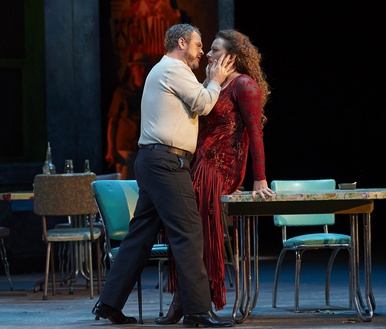 Pomeroy and Margaine steam up the COC's Carmen. Photo: Michael Cooper.
Pomeroy and Margaine steam up the COC's Carmen. Photo: Michael Cooper. The production has many good things going for it: intelligent staging from Toronto director Joel Ivany (in his debut with the COC), and intricately realistic sets and costumes from Michael Yeargan and François St-Aubin, respectively. Strictly speaking, this Carmen is an update, placed in Cuba in the 1940s. But it’s done so smoothly and effectively that most of the opera fundamentalists in the audience – the kind of people who get their knickers in a twist about the “composer’s intentions” – probably didn’t even realize they should have felt offended.
For a while, in Act I, that’s where I feared this production was headed – thanks to an opening scene populated by suitably skanky factory girls and leering soldiers. And at first, the evening’s Carmen, mezzo Clémentine Margaine, seemed to fall in with the clichés of her role, all swirling skirts and hands on hips.
But then something else started to happen: a volatile chemical bond between Margaine and tenor David Pomeroy began to simmer. It was a long, slow boil, over four acts, as the two principals played off each other to increasingly trenchant effect. Insightfully, Margaine coaxes forth the repressed emotionalism of Pomeroy’s Don José. The obedient but conflicted soldier of Acts I and II convincingly becomes the jealous, violent lover of Act III. And in Act IV, Don José grows even more governed by his emotions than Carmen is – and she is the conflicted one, recalling her former feelings for Don José, even as she rejects him.
All this scenery-chewing was heightened by the vocal talents of Margaine and Pomeroy. She has a rich, dramatic mezzo voice, strong in all registers. And he is entirely her match, with an increasingly dark and powerful voice, as his character unravels.
I wish I could speak as highly of baritone Zachary Nelson, cast as Escamillo. To be sure, he brings a confident swagger to his role, but was hobbled by a voice that sounded veiled and distant in his “Toreador’s Song.” As Micaëla, soprano Karine Boucher had a smallish but pretty voice, well suited to her character. Bass Alain Coulombe was a steadfast Zuniga – and soprano Sasha Dhihanian and mezzo Charlotte Burrage made the most of their roles, as Frasquita and Mercédès, respectively.
The COC Orchestra and Chorus, and also the Canadian Opera Children’s Opera Company, made vivid contributions to the production. Conductor Paolo Carignani drew plenty of colour from Bizet’s score and maintained a lively pace.
This is a successfully edgy Carmen – a production that breathes refreshing life into Bizet’s opera, even as it respects the opera’s essential qualities.
I should also mention that Wednesday’s performance was by the “B” cast. I can’t compare these singers to the “A” cast because I wasn't at the opening night. But what I can say is that anyone who is thinking of buying a ticket for the COC’s Carmen (which runs to May 15), shouldn’t be put off hearing this cast because they didn’t open the show. These singers are well worth a trip to Queen Street and University Avenue.
© Colin Eatock 2016
 RSS Feed
RSS Feed

